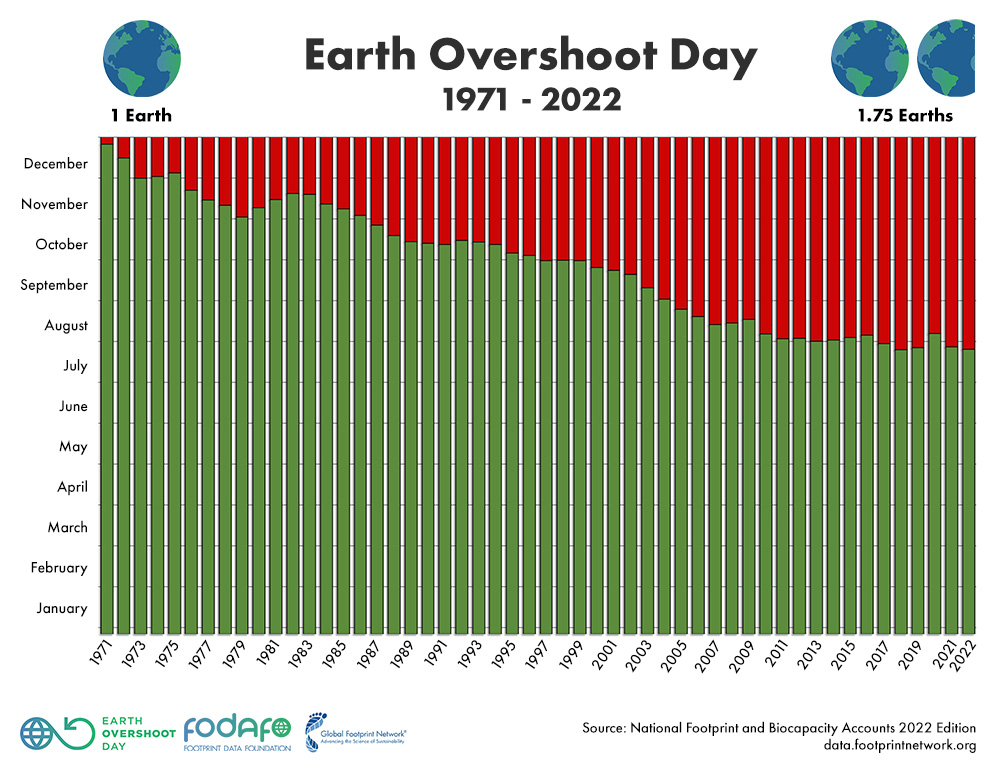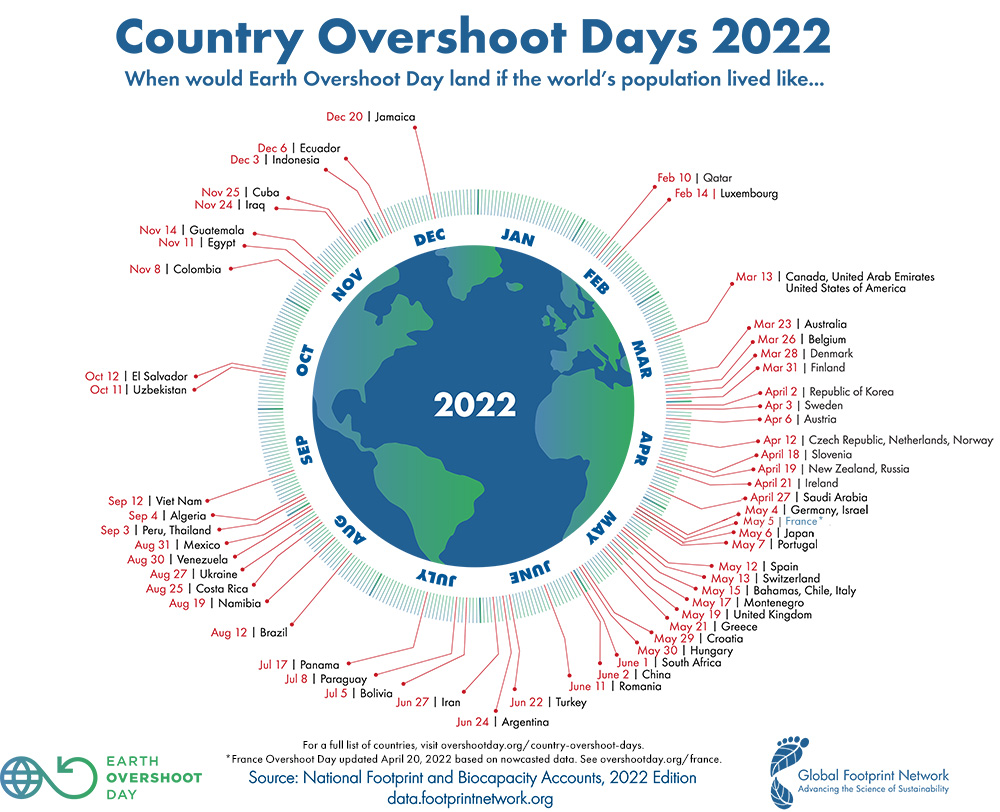Your Cart is Empty
INFO

What Is Earth Overshoot Day 2022 & What Can Be Done
July 21, 2022 4 min read
What Is Earth Overshoot Day?
In 2022, Earth Overshoot Day falls on the 28th of July. Earth Overshoot Day marks the date when humanity’s demand for biological resources has surpassed what the Earth can regenerate during the entire year.
In essence, this means that starting on that date and continuing until December 31st, we are in ecological debt to the planet. With five months left, we will already have exceeded the Earth's whole budget.
How Is Earth’s Overshoot Day Worked Out?
Global Footprint Network figures out when Earth Overshoot Day is each year by counting the number of days that Earth's biocapacity would be enough to meet humanity's Ecological Footprint. Global overshoot corresponds to the rest of the year. Calculating Earth Overshoot Day involves multiplying the result by 365, the number of days in a year, and dividing the result by the planet's biocapacity, or the quantity of ecological resources Earth can generate that year.
(Planet’s Biocapacity / Humanity’s Ecological Footprint) x 365 = Earth Overshoot Days
The National Footprint and Biocapacity Accounts calculate the global ecological footprint and biocapacity measurements each year. These accounts use UN statistics and include the most recent information and accounting standards. Ecological Footprint and biocapacity are "nowcasted" to the current year using the most recent data from additional sources, such as the Global Carbon Project, to calculate this year's Earth Overshoot Day.
You can learn more about the statistics by checking out the Earth Overshoot Day website.

The last time we were close within the boundaries of the Earth's biocapacity was in the early 70s. (Earliest data available at Global Footprint Network).
We went from living (nearly) sustainably to a state where we have depleted all of the resources within 6 months and 28 days due to deforestation, overfishing, global warming, and biodiversity loss, in less than 50 years.
Unfortunately, even the coronavirus catastrophe was unable to move the date back far enough. Earth Overshoot Day was momentarily delayed in 2020, but it quickly returned to its previous level reached in 2019.
Do All Countries Have An Earth Overshoot Day?
Of course, some nations consume more than others do, and each has its own Earth Overshoot Day, which is the day on which Earth Overshoot Day would fall if everyone in the globe consumed as that nation's citizens do. Overshoot Day this year fell on February 10 in Qatar, December 20 in Jamaica, and May 19 in the UK.
Not every nation will have an overshoot day. A country will only experience an Overshoot Day if its Ecological Footprint per Person exceeds the global biocapacity per Person (1.6 gha). Countries without an Overshoot Daycare are those whose Ecological Footprint per Person is smaller than the global biocapacity per Person (1.6 gha).

Around 50 countries don’t have an overshoot day, including India, Sri Lanka, the Philippines, and Bangladesh.
The Global Footprint Network Footprint Explorer
The Global Footprint Network has identified five important areas where we urgently need to adapt and reduce how we use natural resources:
Planet: How we help nature thrive
Biological resources such as healthy soil, water, and air are critical to human well-being and the survival of our species. Practices that support our planet and humanity's ability to flourish include conservation, restoration, and regenerative approaches.
Cities: How we design and manage cities
Cities can sustain fantastic lives with a considerably smaller environmental impact if we make them efficient, bike and pedestrian-centric, and compact. Natural capital supply and demand must be balanced, and city planning and development plans play a critical role in this.
Energy: How we power ourselves
Our impact on the world and its systems is greatly influenced by where we get our energy. To combat climate change, decarbonising is our greatest hope to rebalance the planet's resources and our ecological footprint.
Food: How we feed ourselves
Food production now takes up around half of Earth's biocapacity. Sustainability is influenced by how we address one of our most fundamental needs, food. Several factors influence the quality of our food: the region from which it originates, the method by which it is transported, and even the type of food itself. Reducing our meat intake will create the biggest difference.
Population: How many of us there are
To ensure that everyone has a safe and secure life in a finite environment, we must handle the population increase.
Want to find your own overshoot day? The Global Footprint Network also offers a quiz to help you discover how many planets we’d need if everybody lived like you. Take the quiz here.
How Can We Push Overshoot Day Back?
Our future is not always determined by the past. We can change the way we use natural resources and improve the quality of life for everyone by making smart, forward-thinking decisions.
All of us can take action to reduce our environmental footprint. From reducing your meat intake and decreasing your food waste, to going plastic-free in the kitchen and switching to renewable energy, there are areas throughout your life that can be changed to push back Earth Overshoot Day.
What Is #MoveTheDate?
Five areas of change are the focus of the #MoveTheDate campaign: the planet, cities, population, energy, and food.
Research conducted in 2019 by Global Footprint Network and Schneider Electric revealed that decarbonizing power and improving the energy efficiency of existing structures might help move Earth Overshoot Day back by 21 days. The date may be reserved by 10 days if food waste could be cut in half. Global CO2 emissions may be cut in half, saving 93 days in total. The date may also be pushed back 17 days if people stopped eating meat.
The speed of regression has recently been slowed down by some of the actions already being taken globally. According to the organisation, Earth Overshoot Day has moved up the calendar by less than one day a year on average over the past five years as opposed to about three days annually before that.
If we can push the Overshoot Day back by 5 days per year, then by 2054 we will be living within the boundaries of the planet again.
-
Wild & Stone's mission is to create stylish, easy to adopt and usable alternatives to common plastic products around the home. We source all our products sustainably, from raw material to final delivery. Shop our wide range today.
Also in Sustainable Living Blog

8 Tips for a Sustainable Commute
June 29, 2023 5 min read
The way you get to work can have a huge impact on your carbon footprint, and both you and your employer play an important role in encouraging a greener commute. Learn more here.
Read More
Eco-Friendly Beach Essentials
June 22, 2023 4 min read
By making more conscious choices, we can enhance our beach trip while minimising our environmental impact. In this blog post, we'll explore the top eco beach essentials for your next trip.
Read More
Eco-Friendly Summer Activities for Summer 2023
June 15, 2023 4 min read
From walks on beautiful coastlines to events hosted in your own garden, make the most of the good weather and time spent with your loved ones with these eco-friendly summer activities.
Read MoreMake your inbox a little more eco!
Sign up and save 10% on your first order of 2 items or more.
Keep an eye on your inbox for the latest eco trends, articles, deals and product releases.


